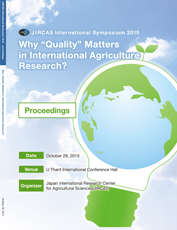To establish an agricultural system which harmonizes human life with the environment through smart use of rural resources in a regional environment - JIRCAS's climate change initiatives for the Mekong Delta, Vietnam

In the Mekong Delta, Vietnam, the Japan International Research Center for Agricultural Sciences (JIRCAS)
and Can Tho University (CTU), collaborating with other institutions, have been carrying out several research
activities, three of which directly aim to mitigate greenhouse gas (GHG) emissions from agricultural activities
and at the same time, to further farmers’ interests. One of the three activities is conducted in rice paddies that
are widely stretched over the Mekong Delta and were reported to have yielded 21 Mt of rough rice in 2008
(Can Tho Statistical Office, 2010); this was equivalent to twice the total production of Japan. The activity
involved the introduction of a water-saving irrigation technology, which resulted in over 50% reduction
in GHG emission and higher grain yields. The second research activity is carried out in the field of stock
raising, which is expected to flourish in the region, to mitigate methane (CH4) emission from beef cattle by
developing and utilizing total mixed rations (TMRs). They provide adequate nourishment to meet the needs
of cattle. Feeding cattle with TMRs resulted in increased rate of body weight gain and effective reduction
of CH4 emission from beef production per cattle compared with a forage-only diet feeding. The last activity
involves the development of a local project in line with the Clean Development Mechanism (CDM), an
international effort that helps disseminate mitigation measures against GHG emissions. Under this project,
which is entitled “Farm Household Biogas Project Contributing to Rural Development in Can Tho City”,
biogas digesters (BDs) that generate CH4 fuel from livestock excrement for household use, e.g., for cooking,
were distributed. The emission reduction achieved through this project resulted in the issuance of Certified
Emission Reductions (CERs or carbon credits) by the CDM Executive Board under the rules of the Kyoto
Protocol (UNFCCC CDM 2015; Izumi et al. 2015).
The results individually obtained from each of these research activities, namely on rice, beef cattle and
BDs, can be linked up together to enhance the efficiency of utilization of local materials/nutrients available
in the Mekong Delta. For example, the large amount of rice straw, estimated to be 24 Mt y-1 (in dry weight
of the total aboveground biomass; Hong Van et al. 2014), which is derived from the huge rice production in
the Mekong Delta, needs to be tapped. With an integrated approach, it is possible to realize an environmentfriendly,
profitable agriculture in the region. Underutilized or inefficiently utilized materials/nutrients in
the region could be used efficiently by linking up the three components as follows: 1) rice straw, only 21%
of which is estimated to be positively utilized in the region (Hong Van et al. 2014), can be utilized as feed
in cattle raising instead of burning them (Arai et al. 2015); 2) cattle excrement can be utilized for CH4
generation by using BDs (Izumi et al. 2015) instead of discharging them into water systems; and 3) BD
effluent, waste fluid from BDs, can be utilized as fertilizer for rice cultivation. Through this linkage approach,
rice and beef/milk production may be increased or kept at the present level without the need to increase or
reduce the application rate of fertilizer and forage, respectively; and additionally, CH4 fuel from BDs would
be available for household use. On the contrary, increasing rice and beef/milk production following the
conventional way, i.e., without integrating the said three components, would require increased fertilizer and
forage input from external sources, consequently increasing local environmental loads. The combined use
of the above-mentioned research results, is expected to exert a positive impact on GHG emissions reduction
efforts not only at the regional level but also globally.
The linking up of the technologies that we have already developed in the Mekong Delta serve as our
next challenge in our pursuit to establish an agricultural system which harmonizes human life with the
environment in the region.
| Date of issued | |
|---|---|
| Creator | Yasukazu Hosen |
| Subject |
rice livestock biogas digester greenhouse gas emission Mekong Delta |
| Publisher | Japan International Research Center for Agricultural Sciences |
| Available Online | |
| Issue | 2015 |
| spage | 48 |
| epage | 55 |
| Rights | Japan International Research Center for Agricultural Sciences |
| Language | eng |
